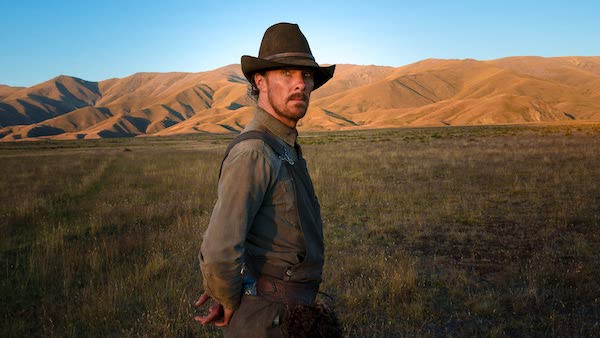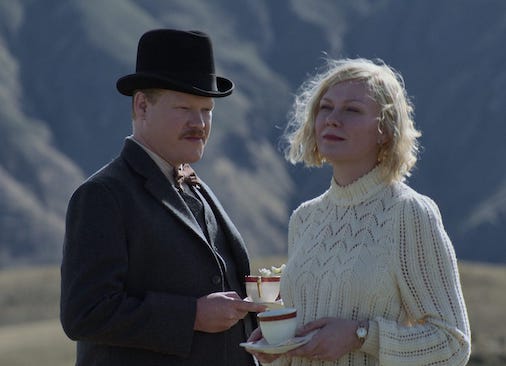Film Review: “The Power of the Dog” — A Beautiful Study in Contrasts
By Tim Jackson
Director Jane Campion’s sharp adaptation of Thomas Savage’s novel focuses on the damage done to those who surrender to the alluring but pernicious “sword” of social conformity.
The Power of the Dog, written and directed by Jane Campion. Now playing Kendall Square and Coolidge Corner Cinema.

Benedict Cumberbatch in The Power of the Dog.
The Roaring 20s, like today, was an era of America in conflict. The country was in transformation: the urban world of jazz, bootleg booze, and flappers clashed with provincial rural values. Frederick Lewis Allen has it right in his study Only Yesterday — there was a “revolution in morals and manners.” Jane Campion’s film, The Power of the Dog, is a slow-burning drama , set in 1925, that probes shifting expectations regarding gender, class, and education. The film is set on a cattle ranch in Montana: Phil and George Burbank (Benedict Cumberbatch and Jesse Plemons) are brothers from a wealthy ranching family. After George suddenly marries a struggling widow, Rose Gordon (Kirsten Dunst), and moves his bride into the family house with her teenage son Peter (Kodi Smit-McPhee), relationships among the four in the Burbank home turn poisonous.
The screenplay, written by Campion, is remarkably faithful to the spirit of Thomas Savage’s 1967 novel. The director’s poetic imagery recalls the accomplishment in her most commercially successful film, The Piano. Director of photography Ari Wegner (Lady Macbeth) makes the most of a striking contrast: open ranges, mountains, and cattle roundups versus the Burbank estate’s musty gothic interiors. Men’s work is highlighted: visceral shots of the dusty labor of ranch hands who feed and maintain the herds, castrate bulls, and skin cows for their hides. These images are also used dramatically, as when two men braiding a cowhide rope becomes a telling allegory of male bonding. The melodramatic narrative is enriched by a melancholic Western score by composer Jonny Greenwood (Spencer, Licorice Pizza) filled with banjos, acoustic guitars, and fiddles.
The smarter of the brothers, Phil Burbank, is a college graduate and a decent amateur banjo player armed with a sharp, often cruel wit. As a cattle boss, he is fair and respectful of his hires, though he considers them his intellectual inferiors. He rarely socializes, preferring to keep to himself. Despite his education, Phil eschews the trappings of civilized life. Unlike his brother, George is a simple man, neatly dressed, straightforward in his dealings with the world, patient with the endless taunting of his sibling.
At the beginning of the film, Rose is a cook, the owner of an establishment that houses and feeds the Burbank ranch hands. One evening, Phil finds Rose weeping after the ranchers have spent their meal mocking her effeminate teenage son, Peter, who served the food and decorated the table with homemade paper flowers. Taking Rose’s side, George pitches in to help serve the next meal. Soon after, whether from sympathy or infatuation, he awkwardly proposes marriage. Gobsmacked — but charmed by his gentleness — she accepts. Rose and her son move into the sprawling Burbank home. Rose, the uneducated widow of a suicidal physician, and Peter, with his graceful demeanor, are soon at odds with the ranch’s blend of high society and the boisterous macho culture. Finding the situation socially unacceptable and offended by her sudden presence in his home, Phil sets out to undermine the relationship.
The Power of the Dog is an effective study in contrasts due in part to its brilliant casting. Cumberbatch is often chosen to play neurotically sensitive and gifted characters, notably Alan Turing (The Imitation Game), Sherlock Holmes, and Dr. Strange. Here, he plays against that impression, but his gentle demeanor underlines Phil’s conflicted identity. Cumberbatch claims that he spent weeks preparing for the role, including taking instruction in castrating bulls. The image comes up early in the novel: “Phil always did the castrating; first he sliced off the cup of the scrotum and tossed it aside … into the fire where the branding irons glowed.” It is a fitting metaphor for a character who is both repulsed by and attracted to Peter’s resolute femininity. Phil’s determination to live a rough-hewn life smacks of overcompensation: it is underlined by his tendency not to wash regularly, work without gloves, and to readily accept challenges to his physical prowess. Savage’s book underplays Phil’s repression. Campion follows suit, drawing on visceral images and a vague backstory about a mythic mentor named Bronco Henry to hint at his closeted impulses. “The love that dare not speak its name” is kept at a narrative distance — except for a surprising revelation that flips the story on its head.

Jesse Plemons and Kirsten Dunst in The Power of the Dog.
George’s optimism has not been diminished by years of ridicule. His sudden marriage may be as much about empathy as it is about infatuation, but is also a way to assert himself as superior to his more intelligent brother. Plemons evokes George’s natural openness, his heartbreaking vulnerability. In a scene drawn directly from the novel, George and Rose are out on a cold, open prairie having a quiet picnic together. George struggles for conversation. Eventually, he turns to his new bride:
“Rose?”
“Yes?”
“Oh, Nothing. Well, I was just going to say how nice it is not to be alone.”
“We’ll never be alone again, George.”
Meanwhile, Rose and Peter struggle against the tides of social disapproval. A widowed woman raising a son and remarrying outside her status is viewed with disdain, as is a woman trying to assert her worth in a rural patriarchy. Her marriage to George answers her financial needs, but she is belittled at every turn, her every effort to please her husband and others in the Burbank household mocked. She takes to the bottle in response. Peter, on the other hand, remains his awkward self, unapologetically effeminate. The character exudes an eerie calm, conveyed through his direct stare as well as his penchant for well-pressed clothes, for reading, drawing, and maintaining a journal, and for poring over books in his late father’s library. He also takes on challenges when they are offered: he effortlessly snaps a wounded rabbit’s neck to put it out of its misery. Unlike those around him, Peter appears to be the most comfortable in his own skin. In another scene found in the novel, Phil, setting up a sly test of Peter’s intelligence and imagination, challenges the boy to describe what he sees when he looks at the mountain range.
“A dog,” Peter said. ‘A running dog”
Phil stared and ran his tongue over his lips. “The hell,” he said. “You see it just now?”
“I saw it when I first came here,” Peter said.
This is indicative of the quiet wisdom of a boy who, acutely aware of the gender games being played around him, has steeled his resolve to accept his nature. The film’s title refers to lines in Psalm 22:20. Here they are from the American Standard Version of the Bible:
Deliver my soul from the sword
My darling from the power of the dog.
In the context of the novel and the film, “the sword” refers to forces that would destroy a person’s best, true, or holiest self. “My darling” alludes to the essential nature of a person. “The power of the dog” alludes to the powerful, to those who draw sustenance from destroying a person’s best self. (Dogs were once regarded as scavengers who attacked the vulnerable.) Campion’s sharp adaptation of Savage’s novel focuses on the damage done to those who surrender to the alluring but pernicious “sword” of social conformity.
Tim Jackson was an assistant professor of Digital Film and Video for 20 years. His music career in Boston began in the 1970s and includes some 20 groups, recordings, national and international tours, and contributions to film soundtracks. He studied theater and English as an undergraduate, and has also has worked helter skelter as an actor and member of SAG and AFTRA since the 1980s. He has directed three feature documentaries: Chaos and Order: Making American Theater about the American Repertory Theater; Radical Jesters, which profiles the practices of 11 interventionist artists and agit-prop performance groups; When Things Go Wrong: The Robin Lane Story, and the short film The American Gurner. He is a member of the Boston Society of Film Critics. You can read more of his work on his blog.
Tagged: Benedict Cumberbatch, Jane Campion, Jesse Plemons, Kirsten Dunst

[…] and Currently PlayingC’Mon C’Mon reviewed by Erica Abeel Belfast reviewed by Ezra Haber Glenn The Power of the Dog reviewed by Tim Jackson The Electrical Life of Louis Wain reviewed by Peg Aloi Karen Dalton: In My […]
A good film but I think Terrence Malick might have done it just a little bit better?
Too short to pull it off
I just watched the film and I believe this review perfectly sums up what I have just viewed; I look forward to reading the novel in the future.
There were many subtexts within the film, alluded to also here in this review.
To me it is neither good nor bad, what a good study of character.